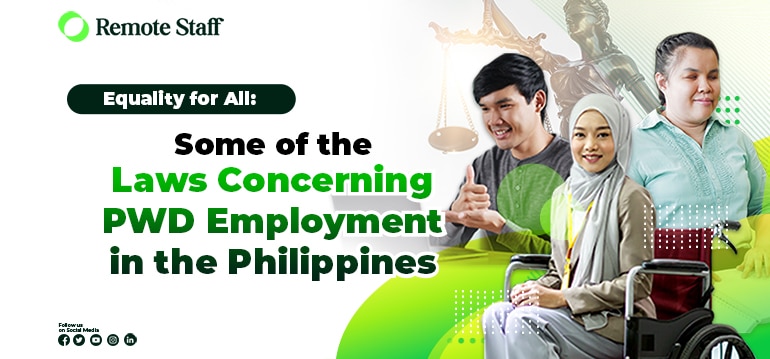Despite what some may believe, there are laws that promote equality for persons with disabilities (PWDs) in the workplace. These laws assure and protect the rights of PWD workers and discuss the responsibilities of employers to their PWD employees.
Unfortunately, a combination of not knowing these laws and social stigma prevents persons with disabilities in the Philippines from enjoying these laws. These reasons are why a large part of the advocacy for equality in the workplace focuses on informing both employees and employers of the PWD employment laws in the Philippines.
But with the increase in job opportunities for PWD workers via remote work, there is now a need to spread awareness of these laws to new work from home PWDs. To help with these efforts, here is an overview of some of the PWD employment laws in the Philippines. This overview will focus on what each law stipulates and what they mean for PWD workers.
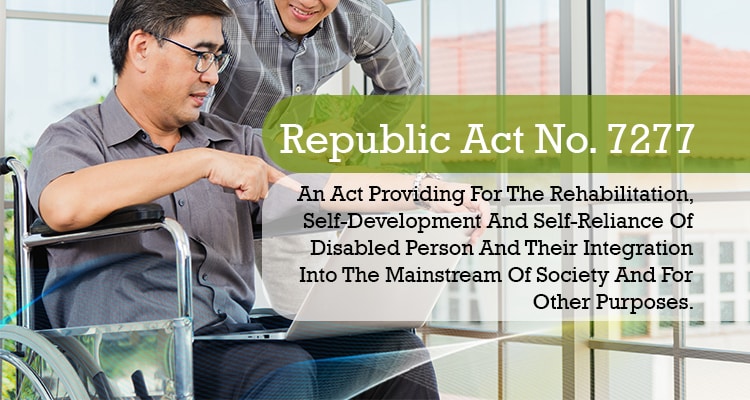
Republic Act No. 7277
Also known as the Magna Carta for Disabled Persons and For Other Purposes, Republic Act No. 7277 covers the bill of rights and labor code for PWDs in the Philippines. It also contains the definitions of terms related to persons with disabilities. But for this article, we shall focus primarily on Sections 5-11, as these focus on the employment of persons with disabilities.
Section 5
Section 5 of RA 7277 stipulates the equal opportunity for employment for PWDs. It means that if a PWD is qualified for the job, they should be allowed the chance to be employed. Also, PWDs should be subject to the same terms and conditions as regular workers, including the same compensation, benefits, fringe benefits, allowances, and incentives.
Section 6
Section 6 stipulates the provision of sheltered employment to PWD workers by the government. This kind of work arrangement occurs when other forms of employment aren’t available for the PWD worker. A sheltered employment setup allows PWD workers to work in a setting where they’re more comfortable.
Section 7
Section 7 gives the provision for apprenticeship opportunities for eligible PWD workers. This provision allows PWD workers to gain valuable work experience, provided their disability won’t hinder their work performance. It also provides for their employment eligibility, provided they complete their apprenticeship after some time.
Section 8
This section is where things get interesting. This section provides for the incentives gained by private companies when hiring PWD workers. These benefits are in place to encourage private businesses to employ PWD workers in their companies.
Companies with PWD workers are entitled to an additional deduction of 25% of the total amount paid as salaries and wages to PWD workers from their gross income. This deduction only applies if the company presents proof of employing a PWD that’s certified by the Department of Labor and Employment. The PWD employee must show proof of their accreditation by DOLE and the Department of Health on their disability and qualifications.
Another benefit they can receive from hiring PWD workers is a deduction from their net taxable income. This deduction is equivalent to 50% of the direct cost for improving and modifying their physical facilities for their PWD employees.
However, this won’t apply to the cost of improvement or modifications of facilities required under Batas Pambansa Bilang 344. This aims to improve the mobility of PWDs by requiring certain institutions, buildings, and public utilities to install facilities and other devices for PWDs.
Section 9
This section covers the government’s responsibility to provide the necessary vocational rehabilitation for PWD workers. This provision allows PWD workers to develop their skills so that they can compete for job opportunities. The state is also required to extend these types of services to rural areas as well. Additionally, the government should also promote cooperation and coordination between them and the private sector.
The agencies tasked to conduct these services are the Department of Social Welfare and Development and DOLE. The former focuses on designing and implementing training programs for developing skills that enable them to engage in livelihood activities. The latter focuses on designing and conducting training programs that teach livelihood skills to PWDs workers.
Section 10
This section requires DSWD to implement measures to provide and evaluate vocational guidance and counseling to PWD workers. To accomplish this, DSWD is responsible for training and ensuring the availability of counselors and other suitably qualified staff for vocational guidance and counseling.
Section 11
The final section of RA 7277’s portion for PWD employment focuses on implementing the rules and regulations of the provisions listed above. DOLE must coordinate with both DSWD and the NCWDP to enforce said rules and regulations. The NCWDP stands for the National Council for the Welfare of Disabled Persons.
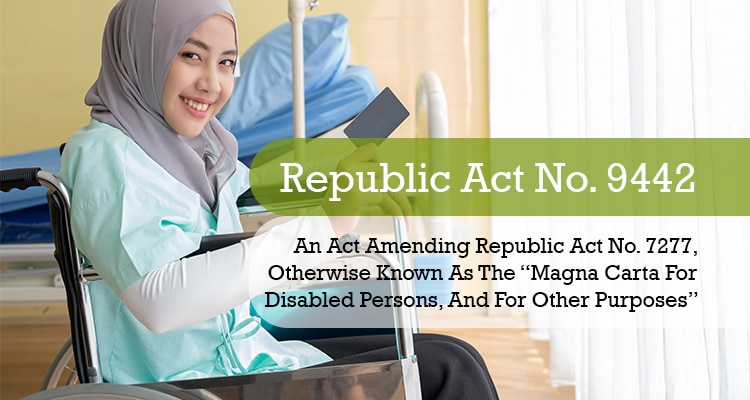
Republic Act No. 9442
Republic Act No. 9442 adds another chapter called “Other Privileges and Incentives” to RA 7277. These privileges and incentives include discounts in hotels, restaurants, movie theaters, carnivals, and many more. This 20% discount also includes medical and dental services, the purchasing of medicine, and public transportation.
These discounts and incentives allow PWD workers to have an easier time accessing public utilities and other services. This addition also gives incentives to the people taking care or living with a PWD as well. This law also introduces the PWD card, which allows persons with disabilities to avail of these benefits.
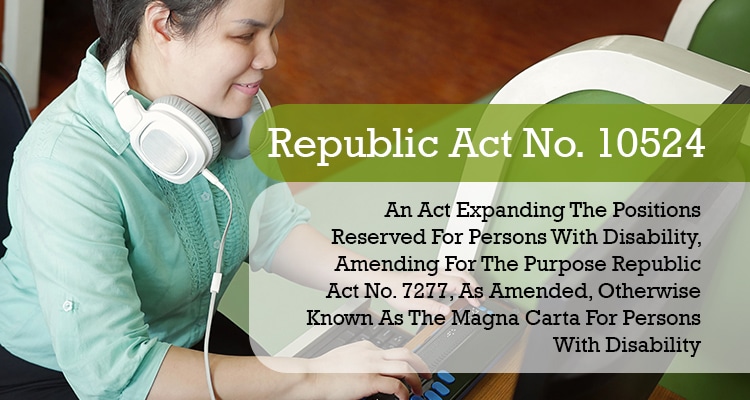
Republic Act No. 10524
Republic Act No. 10524 is another expansion of Republic Act No. 7277. This law amends the provisions of the Magna Carta for PWDs by adding a new requirement in section 5. It reserves 1% of all positions in all government agencies, corporations, and offices to PWDs.
Private companies with more than 100 employees are also encouraged to reserve at least 1% of all offices for PWD applicants. This amendment expands the opportunities for deserving PWDs, as there’s now a mandatory reserve slot for them in government offices.
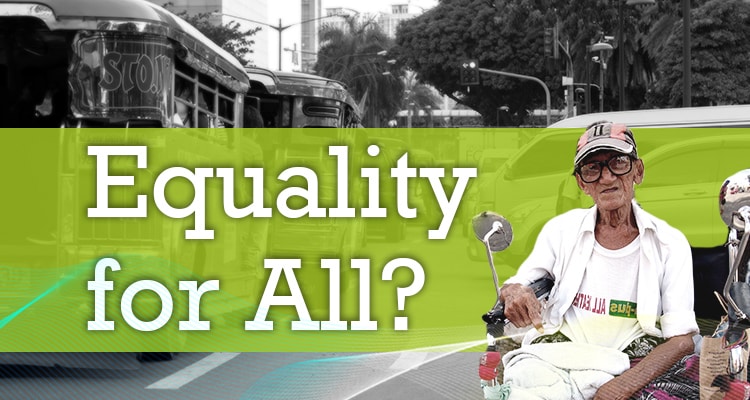
Equality for All?
Despite the number of PWD employment laws in the Philippines, many PWDs still struggle to find a job. As mentioned previously, this could be due to several factors. Lack of opportunities and the prevailing social stigma are just some of these factors. Having laws is one thing, but implementing and enforcing them is another.
However, with these laws and the increase of remote work opportunities for PWDs, things are changing for the better. As more and more PWDs continue to find work online, knowing their rights and privileges becomes paramount. I hope that this article helps you in discovering and understanding the rights of PWD workers.

